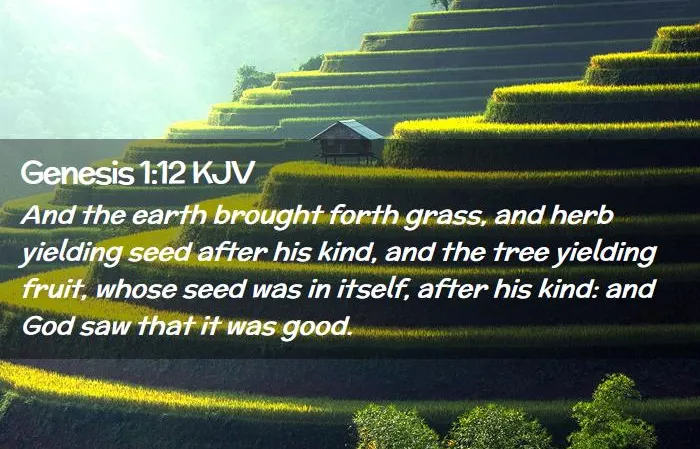Read the Daily Bible Verse Genesis 1:12 To Strengthen Your Spiritual Journey.
Genesis 1:11 KJV Background
Genesis 1:11 (KJV) states: “And God said, Let the earth bring forth grass, the herb yielding seed, and the fruit tree yielding fruit after his kind, whose seed is in itself, upon the earth: and it was so.” This verse is a pivotal moment in the biblical account of creation, detailing the third day of creation when God commands the earth to produce vegetation.
Understanding this verse requires exploring its context within the broader narrative of Genesis and its implications for the natural world.
The Genesis account, traditionally attributed to Moses, is considered one of the foundational texts of Judeo-Christian theology. It provides a sequential account of creation, beginning with the formation of the heavens and the earth and progressing through various stages of development. Genesis 1:11 falls within the account of the third day, where the focus shifts to the formation of plant life, setting the stage for the subsequent creation of living creatures.
See also: WHAT DOES GENESIS 1:8 MEAN?
Genesis 1:12 Meaning
In Genesis 1:12, the divine command to “let the earth bring forth” emphasizes the idea of self-sustaining life. God’s decree results in the earth producing vegetation that includes grass, herbs, and fruit trees, each with the inherent ability to reproduce according to its kind. The phrase “whose seed is in itself” underscores the principle of natural reproduction, where plants generate seeds capable of producing new plants of the same kind.
The mention of “grass,” “herb yielding seed,” and “fruit tree” highlights the diversity of plant life created. Grass represents the simpler, foundational vegetation, while herbs and fruit trees signify more complex forms of plant life. This hierarchical structure reflects the orderly and purposeful nature of God’s creation.
Genesis 1:12 Application in Life
Genesis 1:12 has several practical applications in contemporary life, ranging from environmental stewardship to personal growth. The verse underscores the importance of understanding and respecting the natural world as a reflection of divine order. It encourages a sense of responsibility towards the environment, advocating for the preservation of plant life and ecosystems as part of our stewardship of God’s creation.
The principle of self-sustaining life can also be applied to personal and spiritual growth. Just as plants are designed to reproduce and flourish, individuals are called to cultivate their own lives in alignment with divine principles. This includes fostering qualities such as kindness, patience, and resilience, which can positively impact one’s community and the broader world.
Comparison with Other Biblical Texts
Genesis 1:12 can be compared with other biblical texts that address creation and the natural world. For instance, Psalm 104:14-15 praises God for providing “grass for the cattle, and herb for the service of man,” highlighting the divine provision and care for creation. Similarly, Isaiah 55:10-11 speaks of God’s word causing “the earth to bring forth and bud,” drawing a parallel between divine commands and natural processes.
In the New Testament, Jesus uses agricultural metaphors to illustrate spiritual truths. In John 15:1-8, Jesus describes Himself as the “true vine” and His followers as the branches, emphasizing the idea of growth and fruitfulness that stems from a connection with Him. This imagery resonates with the concept of plants yielding fruit “after his kind” in Genesis 1:12.
Modern Relevance
Genesis 1:12 remains relevant in contemporary discussions on environmental ethics and sustainability. The verse’s emphasis on the earth’s ability to bring forth vegetation highlights the importance of maintaining ecological balance and ensuring the health of our planet. Modern environmental challenges, such as deforestation and climate change, underscore the need for responsible stewardship and respect for the intricate web of life established by God.
Additionally, Genesis 1:12’s focus on reproduction and growth aligns with contemporary values of personal development and resilience. The principles of nurturing and cultivating one’s potential can inspire individuals to pursue growth in various aspects of their lives, including education, relationships, and spiritual practices.
Conclusion
Genesis 1:12 encapsulates a fundamental aspect of the creation narrative: the provision of life and sustenance through divine command. The verse reflects the orderly and purposeful nature of God’s creation, emphasizing the self-sustaining qualities of plant life and its role in the broader ecosystem. Its applications in environmental stewardship and personal growth underscore the timeless relevance of biblical principles in addressing contemporary issues.
By understanding Genesis 1:12 within its biblical and modern contexts, individuals can gain a deeper appreciation for the divine order of creation and its implications for both ecological responsibility and personal development.
Comments on Genesis 1:12
Genesis 1:12 provides profound insights into the nature of creation and the divine purpose behind it. The verse invites reflection on the relationship between humanity and the natural world, encouraging a balanced and respectful approach to environmental stewardship. It also serves as a reminder of the importance of nurturing and developing one’s own life in alignment with divine principles, fostering growth and flourishing in all areas.
By integrating the teachings of Genesis 1:12 into daily life, individuals can cultivate a deeper sense of purpose and responsibility, embracing the divine order and purpose inherent in creation.


